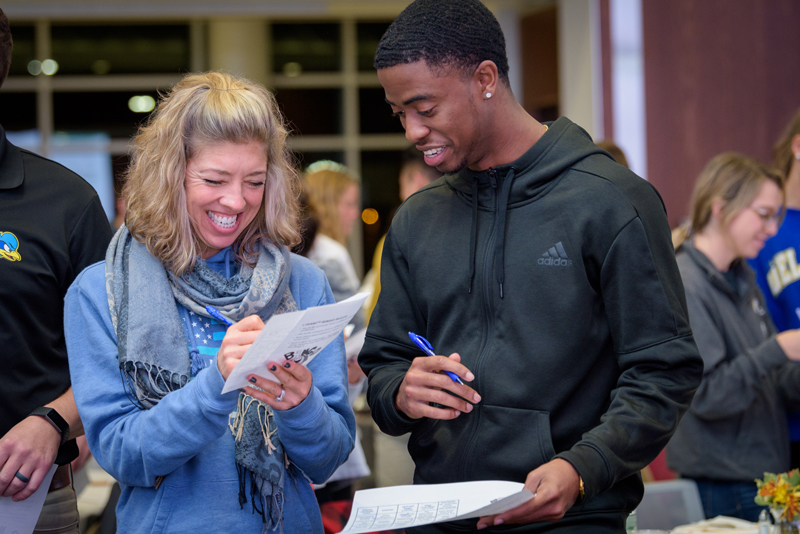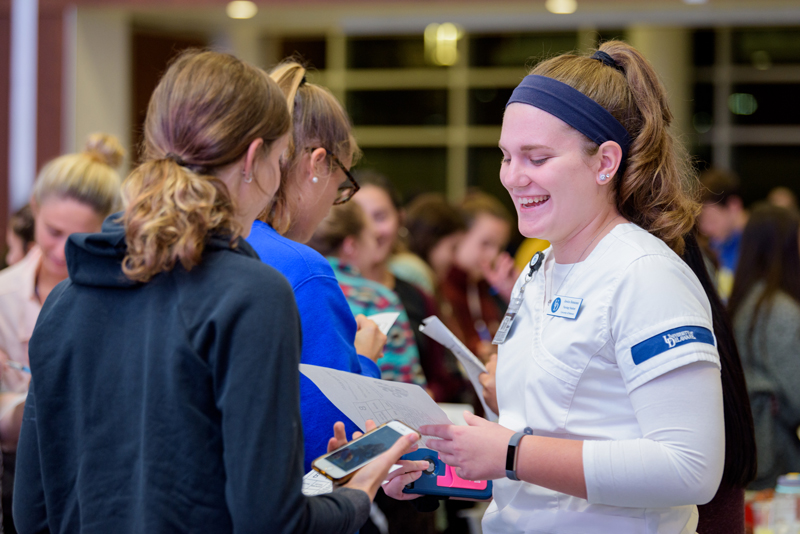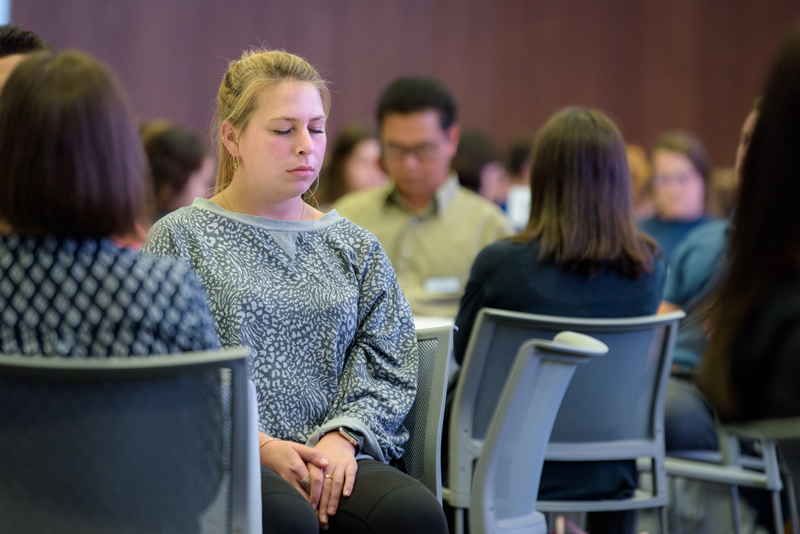

CHS ITEAM: youtube.com/watch?v=rT6B_NSmFNQ
The E in team means empathy
Photos by Evan Krape | Video by Paul Puglisi November 18, 2019
I-TEAM provides interprofessional and empathy training
The students were exercising, but instead of free weights or dumbbells this workout used Legos and visualization techniques to build communication and team-based skills.
This “workout” was part of Interprofessional Training in Empathy, Affect, & Mindfulness (I-TEAM, which is trademarked) — a new interprofessional and interdisciplinary program primarily for first-year graduate students in the University of Delaware’s College of Health Sciences. The program, the first of its kind in the country, combines online lectures and in-person interprofessional small group work to teach and engage students from a variety of health professions in the science and experience of empathy, emotions, and mindfulness.
During the year-long seminar, students will workout empathy “muscles” such as: emotional attunement and resonation, affect recognition, self and other awareness, mental flexibility, observation, presence, listening, and general openness and other-orientation.
The workouts are held in small groups made up of students from a variety of healthcare professions, so they learn with, from, and about each other while engaging on a human-level, not just a clinical-level. In this sense, I-TEAM provides students with the opportunity to practice key clinical team-based skills and embrace vulnerability with their healthcare colleagues. The overarching goal of I-TEAM is to foster key intra/interpersonal and interprofessional skills and habits among the future healthcare workforce.
“Research has shown that patients who perceive their healthcare providers as more empathic have higher satisfaction with their provider, higher rates of compliance, and better physical and mental health outcomes,” said Barret Michalec, associate dean of interprofessional education and the program’s director.
“Providers with high levels of empathy have higher rates of job satisfaction, fewer malpractice suits, higher rates of reimbursement (in this value-based care model), lower rates of burnout, and higher rates of collaboration and cooperation with colleagues. So why aren’t we making empathy training an explicit and meaningful aspect of health professions education? Why isn’t it a ‘given’ in the curriculum?”
CHS Dean Kathleen S. Matt said, “The I-TEAM program is another example of how the College of Health Sciences is making an impact on the future of healthcare. Training students from all disciplines in a key component of clinical care in a very intentional way prepares them to deliver care that is truly patient-centered and comprehensive.”

Healthcare researchers are excited as well. When asked about their goals for the participation in the program, all students expressed their interest in enhancing their empathy skills, as well as becoming more adept at mindful practice. Jessica Eosso, a student in the nutrition sciences doctoral program, said the I-TEAM concepts will allow her to connect with research study participants in a deeper way, adding that the program’s mindfulness component was attractive to her on a personal level.
“I am a person that’s always thinking of the next paper that’s due, the next assignment that’s due, so I wanted to learn how to be more mindful in focusing on the exact moment where ever I am — whether it’s in the program or in my research,” she said.
Unique curriculum, national recognition
The online lectures provide the students with the background on various topics, exposing them to the active “debates” and gaps in the literature, the theoretical foundations, and the prominent voices in the field — encouraging them to dive deeper into the topics on their own. Each in-person “Training Session” features group and individual exercises.
During the first meeting, student teams worked to recreate two Lego figures and because of certain “rules”, the interprofessional groups had to rely on particular communication techniques and team-based skills to build the figures together. Later in the session, students were asked to reflect on what empathy was to them both personally and professionally (and if these were indeed “different”). They then discussed their conceptualizations within their interprofessional groups to highlight similarities and differences in their perspectives.
Every aspect of the I-TEAM program, from the specific workouts, to the small groups, to the more informal nature, is purposely designed utilizing Michalec’s own (and others’) previous research in health professions education and prominent social psychological theory in in/out-group processes, cognitive representation, and social identity formation. “In this sense,” Michalec said, “and because no one health profession can lay claim to being the ‘best’ at empathy, empathy serves as the ‘primordial soup’ from which students can work together through the structure of I-TEAM and these skill building workouts and hopefully, in turn, further develop their interprofessional identity.”
The “workout” sessions are strategically designed to build on each other from meeting to meeting.
“You wouldn’t just go run a marathon, or just go try to squat 300 pounds. You need to build up slowly and purposefully,” Michalec said. “So, why do we expect health profession students, or health professionals for that matter, to just be empathic without any formal or explicit, or consistent, training of their empathy ‘muscles’?
“Similarly, you can’t just step into an empathy training program — it’d be like jumping into the deep end only knowing how to doggy-paddle, you may get to the side, but you’ll struggle. We want our students to have the tools and resources they need to effectively engage with their patients and colleagues.”

The workouts and the year-long program length are unique among empathy-focused program nested within health professions curriculum, he added. They also helped the program gain international recognition as Michalec was named a 2019 Macy Faculty Scholar from the Josiah Macy Jr. Foundation. The scholars program aims to identify innovators in medicine and nursing education and give them the resources to establish new programs.
Interdisciplinary vision
Michalec, who is also an associate professor of sociology at UD, sees the I-TEAM concept working with disciplines outside healthcare as well, including business, education, theatre and criminal justice, among others.
Steven Voinier, a mechanical engineering student in the Biomechanics and Movement Science doctoral program, agreed. He’s part of the EmPOWER group in the College of Engineering, a peer-mentoring program for first-year graduate students.
“We, as engineers, are having a hard time understanding empathy. There’s some concerns that there’s not enough connectedness and not enough time for reflection and helping others out,” said Voinier, an I-TEAM participant. “I want to be part of a system that brings back a community feel and that we can listen to each other and we can set up systems that allow us to handle stress.”
Michalec added, “At its most fundamental level, empathy is an innate human experience. By engaging faculty across the University in I-TEAM, we could further promote a culture of collaboration, interdisciplinarity, solidarity, and collective identity.”

Contact Us
Have a UDaily story idea?
Contact us at ocm@udel.edu
Members of the press
Contact us at 302-831-NEWS or visit the Media Relations website

